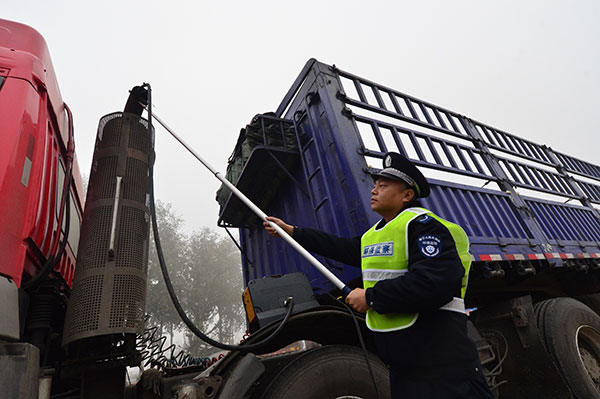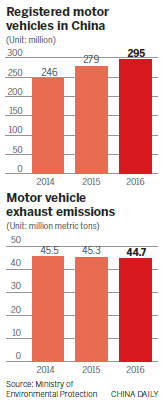Coal trucks to ports will be banned
Source: www.chinamining.org Citation: China Daily Date: June 14, 2017

An environmental inspector tests the exhaust emissions of a truck at a logistics park in Beijing`s Tongzhou district in November.Guo Qian / For China Daily
Only trains will be allowed as part of effort to reduce air pollution
Authorities have put the brakes on diesel trucks transporting coal to and from seaports in northern China. It`s one of a series of new measures to cut vehicle exhaust emissions, a senior environmental official said on Tuesday.
Since April, only trains are allowed to carry coal to Tianjin Port. Other ports, including Cangzhou and Tangshan ports in Hebei province, will follow suit in September, under an air pollution action plan for the Beijing-Tianjin-Hebei region.
Before the ban, diesel trucks were making 6,000 to 7,000 journeys a day to Tianjin Port, Liu Bingjiang, head of air pollution control at the Ministry of Environmental Protection, said on Tuesday at the Environmental Protection Industry Innovation and Development Conference.

Emissions from a heavy diesel truck are equal to those of 200 gasoline-powered cars, he said, adding that the move will significantly lower the concentration of PM2.5, fine particulate matter in the air that can harm health.
Diesel trucks make about 2 million trips to deliver around 60 million metric tons of coal a year to Tianjin Port, according to the ministry.
The coal usually comes from Shanxi and Hebei provinces and the Inner Mongolia autonomous region, via Beijing, making the trucks significant polluters of the Beijing-Tianjin-Hebei regions.
"It wasn`t an easy decision, but we have to push forward despite the huge economic loss if we want to combat air pollution," Yuan Yi, manager of the port`s logistics company, was quoted as saying by Tianjin Daily.
In April, 16 shipments came to the port by train, up from 10 shipments in March.
In addition to the truck ban, the ministry "will take tougher measures to control vehicle exhaust emissions, which have contributed more pollutants in recent years," Yuan said.
Last year, China had 295 million registered vehicles; and in 15 major cities, including Beijing, Tianjin and Shanghai, exhaust emissions contributed between 13.5 percent and 41 percent of all airborne pollutants, according to ministry figures.
About 33 percent of all registered vehicles in China, including trucks and cars, are in the Beijing-Tianjin-Hebei region.
The ministry plans to halt all truck transportation for companies whenever the region issues an emergency warning for air pollution next winter.
It also issued the National VI standard for exhaust emissions - the strictest in the world - which could cut emissions by 90 percent from the National I standard, Liu said.
In addition, along major expressways in the region, new stationary remote-sensing equipment will test moving cars` emission levels by the end of this year, he said.
About CHINA MINING
Since first held in 1999, the scope and influence of CHINA MINING has grown rapidly year by year. As a global mining summit forum and exhibition, CHINA MINING Congress and Expo has become one of the world’s top mining events, and one of the world’s largest mining exploration, development and trading platforms, covering all aspects of the whole mining industry chain, including geological survey, exploration and development, mining rights trading, mining investment and financing, smelting and processing, mining techniques and equipment, mining services, etc. playing an active promotion role in creating exchange opportunities and enhancing mutual cooperation between domestic and foreign mining enterprises.
CHINA MINING Congress and Expo 2014 will be held at Meijiang Convention and Exhibition Center in Tianjin on October 20-23, 2014. We invite you to join the event and to celebrate the 16th anniversary of CHINA MINING with us. For more information about CHINA MINING 2014, please visit: www.chinaminingtj.org.



